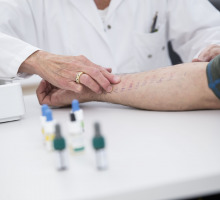Experimentelle Dermatologie
Forschungsgruppe Prof. Dr. Lukas Flatz
Wir untersuchen Patientenproben des Kantonsspitals St.Gallen mit modernsten immunologischen Methoden, um bisher unbekannte Funktionen des Immunsystems bei dermatologischen Erkrankungen zu entschlüsseln. Zudem betreuen wir eine prospektive Kohorte von Patienten, welche mit Immuncheckpoint- Inhibitoren behandelt werden. Im Rahmen der Untersuchung von Patientenproben und der Analyse von Patientendaten in dieser Kohorte kann erforscht werden, wie das Immunsystem Krebszellen zerstört und es zu autoimmunen Nebenwirkungen kommt. Zudem werden in Zusammenarbeit mit der Onkologie des Kantonsspitals St.Gallen interventionelle klinische Studien durchgeführt.
Aktuelle Forschungsaktivitäten
2020-2022
Vaccine- and immunotherapy-induced CD8+ T cell responses against auto-, neo- and foreign antigens
-
Immunotherapies have shown beneficial effects in metastatic melanoma. However, in most cases the disease still relapses. In this project, we monitor patients receiving checkpoint inhibitor therapy and identify alterations on cellular levels as well as on the general disease progression. This will help us in the future
to individualize therapies for melanoma patients and predict the best treatment to the growing number of new checkpoint inhibitors. Furthermore, we address the feasibility of a new antitumor vaccine expressing tumor-associated antigens to initiate potent innate and adaptive immune responses. Therapeutic vaccination should induce CD8+ T cell responses resulting in delayed tumor growth and increased survival.Swiss National Science Foundation, Professorship
Fördermittel Universität Zürich
Principal investigator: Lukas Flatz
Deciphering anti-PD1-induced autoimmune skin toxicity in non-small cell lung cancer
-
The introduction of checkpoint inhibitors has significantly changed the perspective of patients, particularly for melanoma and non-small cell lung cancer. The duration and efficacy of responses to checkpoint inhibitor treatment comes with a substantial inter-individual heterogeneity. In this project, we will assess the role of anti-self T cell responses in non-small cell lung cancer patients undergoing checkpoint inhibitor treatment and investigate whether autoimmune toxicities are associated with an improved outcome for the patient.
Krebsliga Schweiz
Principal investigator: Lukas Flatz
Tertiary lymphoid structures in metastatic melanoma and nonsmall cell lung cancer tissues as predictive markers for the outcome of checkpoint inhibitor treatment
-
Treatment with immune checkpoint inhibitors has revolutionized the therapy of many cancers. However, no predictive biomarkers indicating which patients will benefit from the therapy are available. In this project, we will investigate whether the presence of tertiary lymphoid structures within the tumor microenvironment
is a predictive marker for the clinical response including adverse effects to immune checkpoint inhibitor treatment.Cancer Research Center, Universität Zürich
Principal investigator: Lukas Flatz, Maries van den Broek (Universität Zürich)
Mechanismen der COVID-19 verursachten pulmonalen Autoimmunität
-
Lungenliga St.Gallen – Appenzell
Principal investigator: Lukas Flatz
T cell receptor and single-cell RNA sequencing to determine the specificity and phenotype of tumor-infiltrating lymphocytes in melanoma during immune checkpoint blockade
-
Immune checkpoint inhibitor (ICI) therapy has proven to significantly prolong progression-free and overall survival in patients with melanoma. However, only a subset of patients experiences these clinical benefits. We hypothesize that tumor-specific T cells found in the peripheral blood of melanoma patients before immunotherapy are also present in the tumor tissue itself. The subsequent treatment with immune checkpoint inhibitors leads to changes in the frequency and phenotype of tumor-specific T cells in the peripheral blood and the tumor tissue.
Stiftung für Naturwissenschaftliche und Technische Forschung (Liechtenstein)
Principal investigator: Lukas Flatz
Deciphering the transcriptomic landscape of basal cell carcinoma (BCC) subtypes: a pilot study on 10 nodular, 5 sclerodermiform 5 superficial BCCs, and 5 healthy skin samples
-
Forschungsförderung Kantonsspital St.Gallen
Principal investigator: Lukas Flatz
Towards functionalized nanoparticles for immunotherapy
-
Forschungsförderung Kantonsspital St.Gallen
Principal investigator: Marija Buljan, Lukas Flatz
The role of humoral and cellular autoimmunity for the severity of COVID-19
-
Forschungsförderung Kantonsspital St.Gallen
Principal investigator: Lukas Flatz
Forschungs- und Studiendatenbank
Auf der Forschungs- und Studiendatenbank des KSSG finden Sie nähere Informationen zu den einzelnen Forschungsprojekten und Publikationen der Arbeitsgruppe.
Prof.Dr. Lukas Flatz leitet das Labor für Experimentelle Dermatologie am Kantosspital St.Gallen und ist zudem Ärztlicher Leiter der Sektion für Dermatoonkologie am Universitätsklinikum Tübingen.

